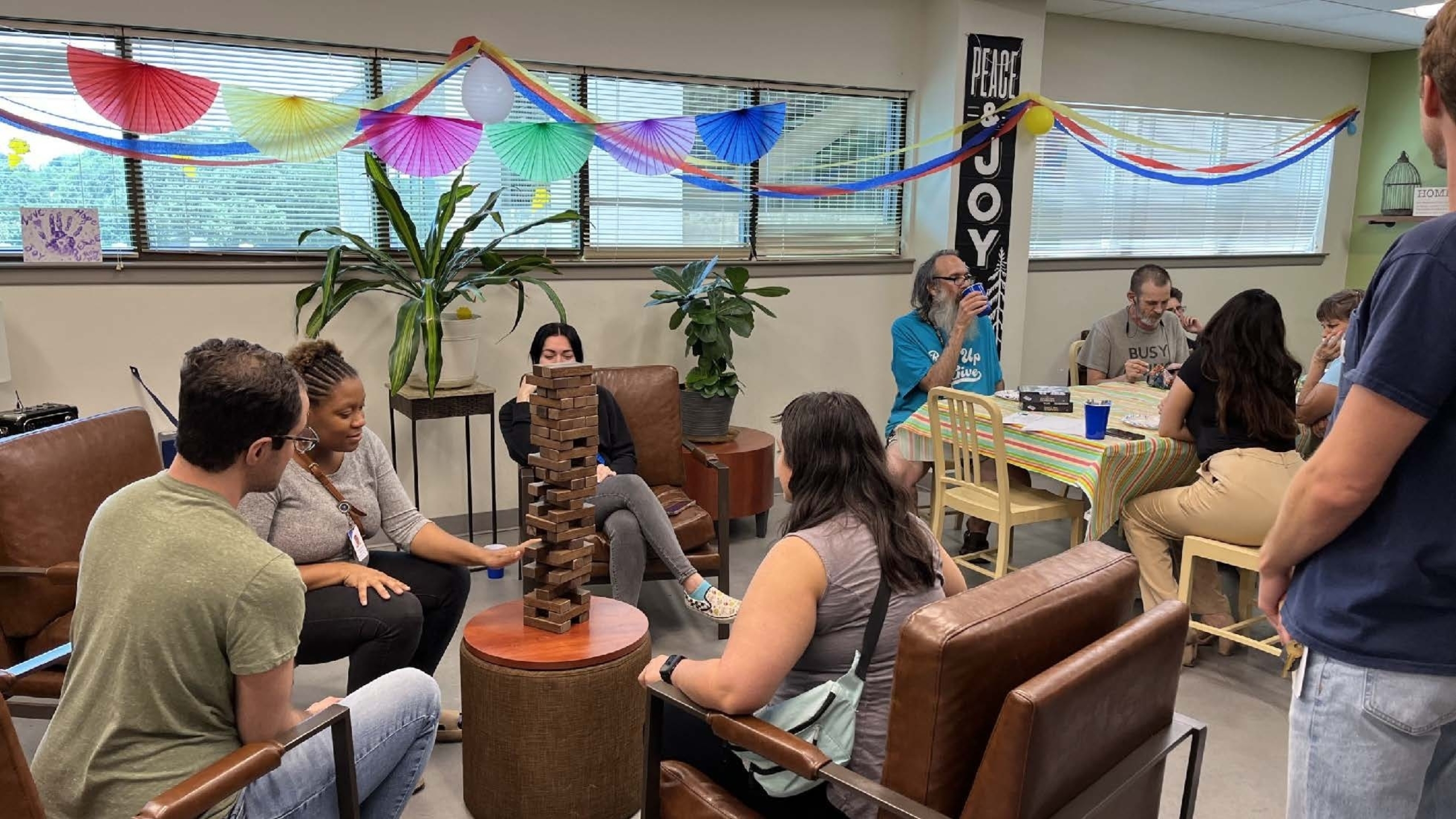
Residents and Integral Care staff gather at a Permanent Supportive Housing Unit. Photo courtesy of Integral Care.
Group of citywide partners convenes to design and implement integrated primary and behavioral health support to residents of more than 1,000 permanent supportive housing units in Austin
AUSTIN, Texas — During the next five years, more than 1,000 Permanent Supportive Housing (PSH) units are expected to house people ending their homelessness at more than 15 locations across Travis County. To improve access to primary and behavioral health care for these people, work led by Austin’s Ending Community Homelessness Coalition (ECHO) and Dell Medical School at The University of Texas at Austin began today to advance the new Permanent Supportive Housing Healthcare Collaborative.
The collaboration’s goal is to bring community stakeholders together to design an actionable working plan for an integrated model of care that community partners will ultimately help to coordinate and implement.
Currently, most people who move into PSH units must access primary care, behavioral health resources and substance use treatment services at different locations in the community and from multiple providers.
“It can be overwhelming and very complicated for individuals in Permanent Supportive Housing to get the care they need to stay healthy,” said Tim Mercer, M.D., MPH, Dell Med associate professor of population health and internal medicine.
“We are working to create a seamless, integrated and person-centered system of care that will make it easier for the residents of these housing units to not just remain in their living spaces, but to thrive in them,” said Mercer, who co-leads the interdisciplinary project at Dell Med with Ashley Trust, M.D., an assistant professor in the Department of Psychiatry and Behavioral Sciences. “This collaborative, community-based work is another example of how Dell Med is fulfilling its commitment to improve health and health care for everyone in Travis County,” said Mercer.
This fall, ECHO engaged Dell Med to lead the collaborative planning phase of this care initiative based upon the clinical expertise of its faculty and experience utilizing successful convening models to engage stakeholders and ultimately improve the health of the community. Dell Med has utilized similar approaches to successfully advance community health in projects including the Austin State Hospital Brain Health Redesign and the Travis County Forensic Mental Health Project.
This initiative builds on efforts by Travis County and City of Austin leaders to address homelessness in the area, including the Travis County Supportive Housing Collaborative and the new dedicated Homeless Strategy Office recently announced by Mayor Kirk Watson and interim City Manager Jesús Garza.
The Permanent Supportive Housing Units are operated by various community organizations including Integral Care, Foundation Communities, Family Eldercare, Caritas, LifeWorks, SAFE, and Endeavors.
Prioritizing Person-Centered Care
“We need to make sure that when we move people into housing that they get the services they need at the right time and in the housing unit,” said Matt Mollica, executive director of ECHO.
“This new collaborative effort will ensure that no matter where these individuals live in supportive housing, and no matter what program or agency they engage for support, they will have access to high-quality health care to help them live the best life possible,” Mollica said.
By joining forces with local partner organizations including Integral Care, CommUnityCare, Central Health and others, clinical teams providing medical and psychiatric care will be fully integrated with wraparound social services on-site, including peer and community health worker support. The psychiatric care provided will also include treatment and recovery support for those with substance abuse disorders — building on existing collaborative work such as the Mobile Medical and Mental Health (M3) Team.
Work on the Six-Month Project Began Today
Today, Dell Med convened a steering committee of leaders from participating organizations to chart a path forward. During the next six months, the PSH Healthcare Collaborative steering committee will empower working groups to hammer out the details involved in shaping the integrated care model. By May 2024, the collaboration is expected to have developed an actionable plan ready to be operationalized by participating community partners.
The current steering committee of the PSH Healthcare Collaborative comprises representatives from more than a dozen organizations, including several people whose lived experience with homelessness provides critical real-world understanding to the group:
- Ascension Seton – Willie Lopez
- Austin City Council (former) – Ann Kitchen
- ECHO – Matt Mollica
- Austin Public Health – Adrienne Sturrup
- Caritas of Austin – Jo Kathryn Quinn
- Central Health – Monica Crowley, Alan Schalscha, M.D.
- City of Austin, EMS System – Mark Escott, M.D.
- CommUnityCare Clinics – Jaeson Fournier, Nick Yagoda, M.D.
- District of Columbia Behavioral Health Crisis Response Team – Richard Johnson
- Dell Seton Medical Center – Elizabeth Schulwolf, M.D.
- Foundation Communities – Walter Moreau
- Integral Care – Marlene Buchanan, Dawn Handley
- Mobile Loaves and Fishes – Alan Graham, Laura Griebel
- Texas Harm Reduction Alliance – Alex White, Maggie Luna
- Travis County Commissioner, Precinct 3 – Ann Howard, Nirav Shah
- Truth Be Told – Rutanya Pearson-Mitchner